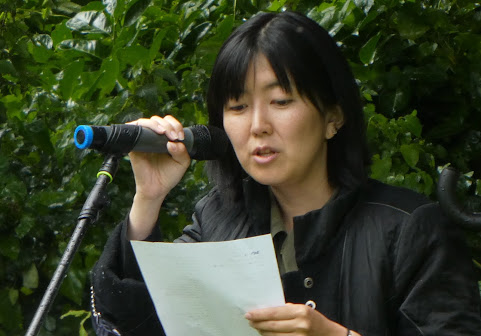The annual commemoration for the victims of the Hiroshima atomic bomb took place at the memorial cherry tree in Merrion Square Park, Dublin, on Sunday, 6th August 2023, the 78th anniversary of the bombing. Despite torrential rain during the ceremony, over 70 people gathered to remember all those affected by nuclear testing and weapons, and to affirm their determination that such an atrocity must never happen again.
Welcoming those in attendance, Irish CND chairperson, Dr David Hutchinson Edgar, paid tribute to the leading roles in working internationally for nuclear disarmament played by Austria, Brazil, Mexico and South Africa, whose ambassadors were present. He noted Ireland's partnership with countries such as these in the New Agenda Coalition, which has recently submitted a strong working paper aimed at breaking what some see as the current stalemate in disarmament negotiations, "Taking Forward Nuclear Disarmament," at the United Nations. He praised Austria's role as host of the first meeting of states parties to the Treaty on the Prohibition of Nuclear Weapons, and acknowledged the vision for a world free of nuclear weapons put forward by Japanese Prime Minister, Fumio Kishida, in the context of the G7 meeting in Hiroshima earlier this year.
Cllr Danny Byrne, representing Dublin City, reminded the audience of the horrors that struck Hiroshima on 6th August 1945, when approximately 80,000 people were annihilated instantly, with casualities reaching 140,000 within a year. He highlighted how each casualty represented not a number, but "human lives with the right to dignity, all terminated by ... the immeasurable brutality of the atomic bomb." He noted that Dublin was the first Irish city to join Mayors For Peace, co-founded by the mayors of Hiroshima and Nagasaki, and re-affirmed Dublin's commitment to the vision of Mayors For Peace: a world free of nuclear weapons, safe and resilient cities, and promoting a culture of peace. Cllr Byrne laid a wreath on behalf of the people of Dublin at the end of the ceremony.
 |
| Cllr Danny Byrne laid a wreath at the memorial tree on behalf of the people of Dublin. |
In a recorded message, Irish CND vice-president, Adi Roche, spoke of the threat to life on earth posed both by nuclear weapons and by the weaponisation of civil nuclear facilities in Ukraine, and decried the massive waste of resources represented by nuclear weapons: "Because of the billions spent on weapons development and production, the people of the world have paid the ultimate cost through hunger, poverty, homelessness, unemployment, environmental degradation, while the big powers have endless funding for militarism and nuclear weapons." She praised the positive contributions of Ireland's policy of active neutrality and called for the use of "the power of our intellect, diplomatic abilities and our negotiating talents to bring an end to the current war in Ukraine and beyond."


